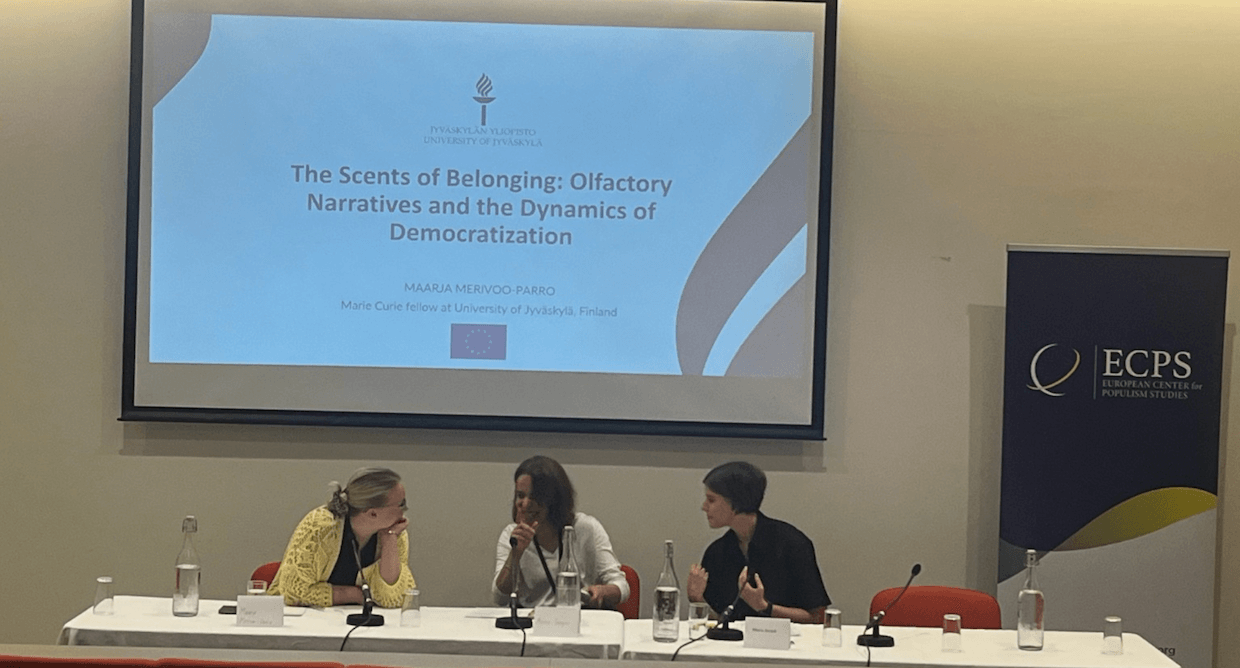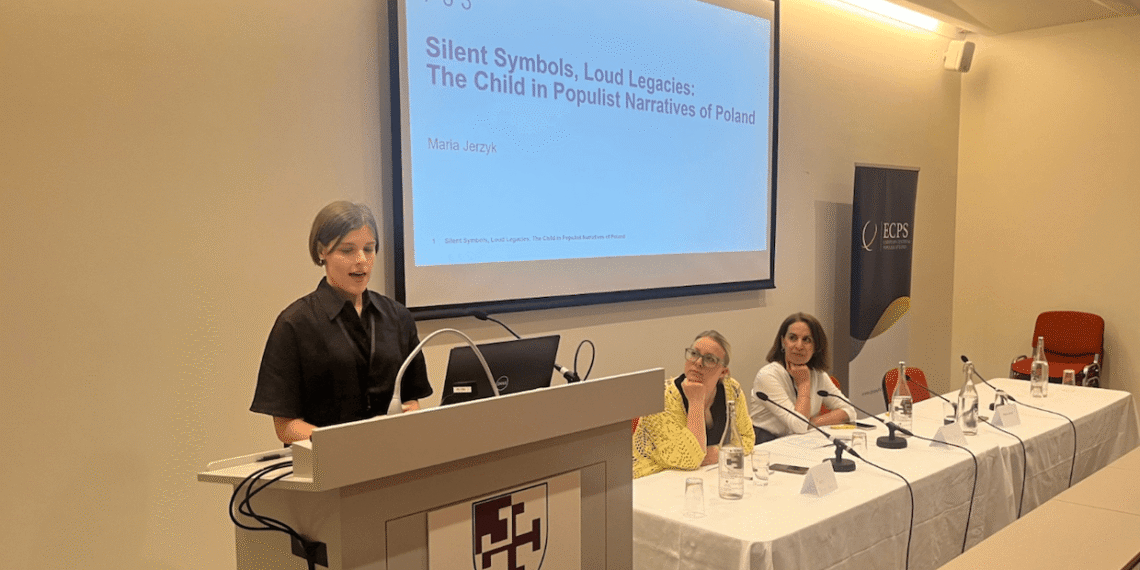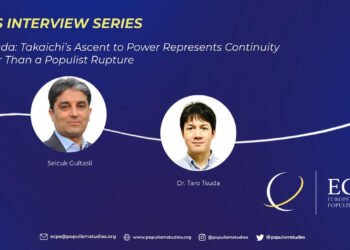Please cite as:
ECPS Staff. (2025). “ECPS Conference 2025 / Panel 4 — Politics of Belonging: Voices and Silencing.” European Center for Populism Studies (ECPS). July 8, 2025. https://doi.org/10.55271/rp00106
Panel IV of the ECPS Conference 2025, held at St Cross College, Oxford University (July 1–3), explored the theme “Politics of Belonging: Voices and Silencing.” Chaired by Dr. Azize Sargın (ECPS), the panel investigated how belonging is constructed and contested through populist discourse and historical memory. Dr. Maarja Merivoo-Parro (University of Jyväskylä) examined olfactory memory and grassroots aid in Estonia’s democratic awakening. Maria Jerzyk (Masaryk University) analyzed how the figure of the child is symbolically instrumentalized in Polish populism, revealing deep continuities with communist-era narratives. Together, the papers offered rich insights into how identity, exclusion, and affect shape democratic participation in post-authoritarian and populist contexts.
Reported by ECPS Staff
Panel IV of the ECPS Conference 2025, titled Politics of Belonging: Voices and Silencing, was held on the morning of July 2 at St Cross College, University of Oxford. As part of the broader conference theme—‘We, the People’ and the Future of Democracy: Interdisciplinary Approaches—this panel delved into how democratic belonging is shaped, contested, and narrated within and beyond populist frameworks.
Chaired by Dr. Azize Sargın (PhD), Director of External Relations at the European Center for Populism Studies (ECPS), the session opened with a theoretically grounded overview of the politics of belonging. Dr. Sargın emphasized that in an age of resurgent populism, belonging is no longer a neutral or merely affective category but a highly politicized mechanism of inclusion and exclusion. Populist actors increasingly construct “the people” by drawing sharp lines between insiders and outsiders, often invoking exclusionary logics tied to ethnicity, morality, or national destiny. Drawing on insights from political theory and migration studies, she outlined two key dimensions of belonging: “to whom one belongs” (social group affiliation) and “where one belongs” (spatial-territorial identity), both of which play critical roles in populist and post-authoritarian contexts.
The panel featured two intellectually rich and methodologically distinct papers. Dr. Maarja Merivoo-Parro (Marie Curie Fellow, University of Jyväskylä) explored the role of olfactory memory in the democratization of Estonia, arguing that cross-border sensory exchanges—especially smells tied to Finnish aid—played a profound role in shaping political consciousness and belonging during the late Soviet period. Maria Jerzyk (Masaryk University, Czechia) examined how children are symbolically deployed in contemporary Polish populist narratives, tracing striking continuities with communist-era state propaganda. She showed how the child functions as both a vessel of national purity and a screen for projecting anxieties over societal change.
Together, these contributions offered a powerful demonstration of how the politics of belonging operate through both the body and the imagination—an approach that resonated strongly with the interdisciplinary aims of the ECPS Conference.
Opening Remarks by Dr. Azize Sargın
Dr. Azize Sargın, Director of External Relations at the European Center for Populism Studies (ECPS), opened the first panel of the second day of ECPS Conference at the University of Oxford with a concise yet conceptually rich introduction to the session’s theme: The Politics of Belonging, Voices, and Silencing. Her remarks served to establish a theoretical and thematic framework, situating the panel within broader academic debates on identity, exclusion, and populism.
Dr. Sargın emphasized that questions of belonging have become increasingly politicized in recent years, particularly under the influence of populist movements that define “the people” through narrow, exclusionary frameworks. Populist rhetoric, she noted, often draws stark lines between insiders and outsiders, thus marginalizing those deemed threats to the imagined national community. This binary logic fundamentally reshapes notions of identity, social boundaries, and democratic participation.
Drawing on scholarship in the field, she distinguished between two core dimensions of belonging: to whom one belongs (social group belonging) and where one belongs (spatial or territorial belonging). She argued that both questions are central to the study of populism—domestically, through the politics of exclusion within state borders, and transnationally, in the experiences of immigrants and diasporas navigating their place within multiple communities.
Importantly, Dr. Sargın differentiated between the personal, affective experience of belonging and the politics of belonging—the latter being a deliberate political project aimed at constructing collective identities. Concluding, she underscored the temporal and contested nature of belonging, and the panel’s aim to explore these dynamics in historical and interdisciplinary perspective.
Maarja Merivoo-Parro: The Scents of Belonging: Olfactory Narratives and the Dynamics of Democratization

In her richly evocative and methodologically innovative presentation, titled “The Scents of Belonging: Olfactory Narratives and the Dynamics of Democratization,” Dr. Maarja Merivoo-Parro (Marie Curie Fellow, University of Jyväskylä) offered a compelling interdisciplinary account of how smell shaped and symbolized the democratization process in late Soviet-era and post-Soviet Estonia. Delivered during Panel 4 of the ECPS Conference 2025 at Oxford University, her paper bridged political history, cultural memory, and sensory studies to examine how grassroots aid from Finnish citizens not only supported material survival but also catalyzed a sensory awakening to democratic possibility.
Merivoo-Parro began by setting the geopolitical stage: the late 1980s economic collapse in Soviet-occupied Estonia, and the contrasting openness of nearby Finland. Despite Finland’s cautious official stance due to “Finlandization”—a Cold War policy of alignment to Soviet interests—ordinary Finnish citizens took unprecedented grassroots action. They formed personal networks with Estonians, delivering tailor-made humanitarian relief (food, medicine, clothes, toys) in an improvised diplomacy of the people. These exchanges were not only materially transformative but also emotionally intimate and culturally revealing.
What made this aid unique, argued Dr. Merivoo-Parro, was its sensory intensity—especially its olfactory dimension. Western hygiene products, foods, and technologies carried unfamiliar yet alluring smells that stood in stark contrast to the scarcity and uniformity of Soviet life. Smell, she explained, is neurologically encoded with emotion and memory, and these olfactory stimuli became vessels of hope, aspiration, and belonging. Finnish deodorant, chocolate, and even the lingering scent of well-laundered clothes subtly communicated democratic abundance, cultivating what she called a “smell of democracy.”
She illustrated this dynamic through oral history, children’s correspondence, and anecdotal recollections—such as a girl’s envy at her Finnish pen-pal’s casual mention of ice cream. These accounts revealed the disjuncture between two neighboring worlds and illustrated how material exchanges carried symbolic, even ideological weight.
Critically, Dr. Merivoo-Parro suggested that this early, tangible exposure to democratic life inoculated Estonia against the pathologies of many post-Soviet transitions. Unlike other former Soviet republics that experienced high levels of corruption and authoritarian backsliding, Estonia pursued a robust democratic trajectory. Dr. Merivoo-Parro provocatively likened this process to Pavlovian conditioning: Estonians became conditioned to associate democracy with reliability, dignity, and material abundance—not through abstract theory but through smell, taste, and lived experience. This sensory grounding helped them “hit the ground running” in 1991, fostering low corruption, high civic trust, and strong digital and educational institutions.
In closing, she proposed that this case demonstrates the need to expand democratic theory beyond legal and institutional frameworks to include sensory, affective, and cultural registers. Belonging, she argued, is not only a political status but also a sensory experience—one capable of fostering or foreclosing democratic identification. Her intervention thus resonated deeply with the conference’s interdisciplinary mission and underscored the value of unexpected analytical lenses in studying democratization.
Dr. Merivoo-Parro’s talk stands as a powerful reminder that democracy is not only read in constitutions or heard in speeches—but smelled, touched, and tasted in daily life.
Maria Jerzyk: Silent Symbols, Loud Legacies — The Child in Populist Narratives of Post-Communist Poland
In her thoughtful and innovative presentation, Maria Jerzyk (graduate student, Masaryk University, Czechia) offered a compelling interdisciplinary analysis of how children function as symbolic instruments within populist political discourse in post-communist Poland. Her paper, titled “Silent Symbols, Loud Legacies: The Child in Populist Narratives of Post-Communist Poland,” brought to light the ideological potency of the child figure—often marginalized in both academic and policy debates—while interrogating its historical continuity and symbolic plasticity from communist to contemporary populist regimes.
Jerzyk opened by observing a common omission in populism studies: while elites, migrants, and minority groups frequently occupy the spotlight as the primary antagonists or protagonists in populist narratives, the child—less visible, less vocal—is often overlooked. Yet, she contended, the symbolic power attached to children is profound. In Poland, particularly under the rule of the Law and Justice (PiS) party, children have been recast as vessels of moral authority, purity, and national continuity. This symbolic construction is neither neutral nor inclusive. It privileges the “ideal child”—patriotic, Catholic, obedient, and heterosexual—while marginalizing children who do not conform, including those who are queer, politically engaged, or critical of nationalist narratives.
To uncover the mechanics of this symbolic deployment, Jerzyk drew from three intersecting disciplines: populism studies, childhood studies, and the sociology of memory. This triangulated framework enabled her to situate children not merely as political recipients or rhetorical props, but as figures embedded in a contested moral economy shaped by post-communist legacies. Her central questions—why exclusionary populist narratives around children still resonate in Poland, and how these narratives adapt motifs from the communist past—guided a deeply contextual and historically grounded investigation.
One of Jerzyk’s central arguments was that populist discourses, like their communist predecessors, rely on a binary construction of the child: one to be celebrated and one to be feared. Under communism, the ideal child was disciplined, collectivist, and loyal to the socialist cause; deviant children were framed as dangerous, Westernized, and individualistic. In the contemporary populist regime, the ideological content has shifted from socialism to nationalism and traditionalism, yet the structural logic remains intact. The ideal child today symbolizes moral rectitude and cultural belonging, while those who diverge—especially children of migrants or LGBTQ+ youth—are seen as ideological threats, vulnerable to foreign influence and moral decay.
Jerzyk offered a particularly striking illustration of how these dynamics are operationalized through the metaphor of the school. In both communist and populist Poland, schools are treated not only as educational institutions but also as ideological battlegrounds where future citizens are shaped. She referenced archival propaganda films from the 1960s in which children, during summer holidays, were depicted building schools with their own hands—a powerful image of self-disciplining youth serving the state. This motif reappears in contemporary populist discourses where state officials position schools as protective spaces for instilling “proper” values and shielding children from ideological contamination, whether from liberal elites, Western media, or LGBTQ+ advocates.
Methodologically, Jerzyk combined discourse analysis of recent political speeches by Law and Justice (PiS) officials with a close reading of archival media from the communist period. This diachronic approach enabled her to identify what she termed “symbolic recycling,” whereby contemporary populists inherit and reframe motifs from the past to legitimize present anxieties. She provided translated excerpts from speeches and slogans to reveal how moral panics are manufactured and how boundaries are drawn between “our children” and “their children”—a division that mirrors broader populist strategies of inclusion and exclusion.
Throughout her analysis, Jerzyk emphasized that children, though prominently featured in populist discourse, are rarely treated as autonomous political subjects. Drawing on insights from childhood studies, she reminded the audience that children are not merely “citizens in the making,” but existing participants in the political community—albeit frequently denied voice, agency, and representation. This silencing, she argued, is symptomatic of a broader authoritarian dynamic, wherein the child becomes a screen upon which adult anxieties, traumas, and aspirations are projected.
Jerzyk’s intervention was also attentive to the role of historical trauma and memory. She introduced the concept of “post-civic trauma”—a form of collective suffering linked to the legacy of communism—which remains latent in many post-communist societies. In Poland, she argued, this trauma is not only remembered but actively instrumentalized by populist leaders who draw upon Cold War tropes of cultural invasion, Western decadence, and moral crisis to justify repressive policies in education and family life.
She concluded her presentation by reflecting on the structural absence of children’s rights in Poland. Notably, the country lacks an independent ombudsperson for children—a role that is subject to parliamentary appointment and thus highly politicized. This institutional gap, coupled with the widespread belief (echoed in a Polish saying) that “children and fish have no voice,” contributes to a civic environment where children are spoken about but rarely spoken with. This cultural and institutional silencing, Jerzyk suggested, reinforces populist strategies that rely on symbolic purity while stifling actual pluralism.
Jerzyk’s presentation ultimately served as both scholarly analysis and normative appeal. She urged the audience to consider how the child—seemingly apolitical—serves as a powerful vehicle for moral panic, exclusionary nationalism, and cultural nostalgia. Populism, she argued, claims to break with the past, yet it inherits one of the most potent symbols of state ideology: the child. In both past and present, the child remains a “silent symbol,” but the ideological legacies it carries speak volumes.
Her talk thus made a vital contribution to the interdisciplinary goals of the ECPS conference. It not only expanded the scope of populism studies but also foregrounded the ethical and political urgency of treating children as full participants in the democratic project, rather than as mute emblems of contested futures.
Conclusion
Panel IV of the ECPS Conference 2025—Politics of Belonging: Voices and Silencing—brought into sharp focus the nuanced and often overlooked ways in which symbolic and sensory politics shape collective identities under populist and post-authoritarian regimes. Through the interdisciplinary lenses of cultural memory, childhood studies, and affect theory, the panel illuminated how belonging is constructed not only through institutional frameworks, but also through deeply embodied and historically situated experiences.
Both Dr. Maarja Merivoo-Parro and Maria Jerzyk underscored the persistence of ideological residues from past regimes, highlighting how present populist actors selectively inherit and retool historical narratives to legitimize exclusionary claims. Their work advanced the conference’s broader aim—captured in its title ‘We, the People’ and the Future of Democracy: Interdisciplinary Approaches—by demonstrating that the politics of inclusion and exclusion unfold not only through speeches and ballots, but through scent, schooling, silence, and symbolic order.
Note: To experience the panel’s dynamic and thought-provoking Q&A session, we encourage you to watch the full video recording above.


